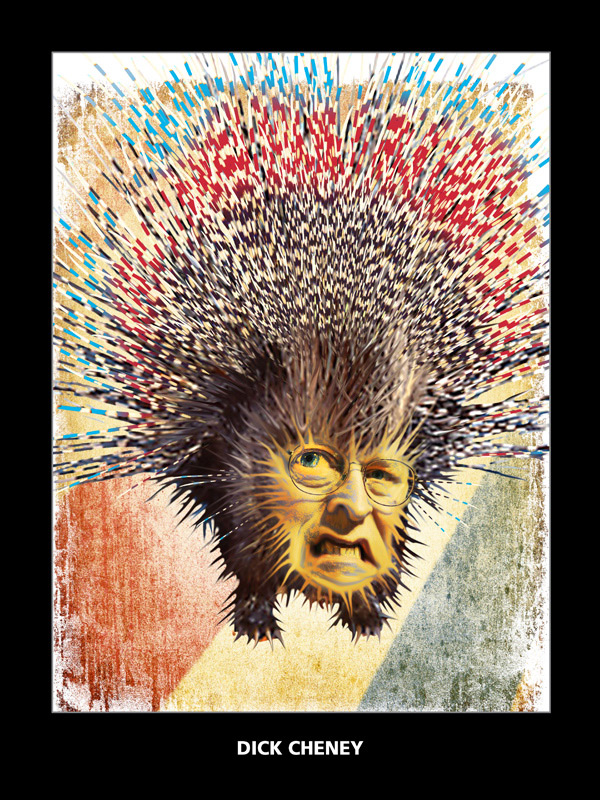
Summary
Dick Cheney’s first political job was as an intern for a Republican Wisconsin congressman. He then joined the staff of Donald Rumsfeld, Director of the Office of Economic Opportunity, followed by several positions in the Ford White House, rising to Deputy Assistant to the president. When Rumsfeld became Ford’s defense secretary, Cheney became White House Chief of Staff.
Cheney was elected to five terms in Congress from Wyoming and served as House Minority Whip. While in Congress he opposed creation of the Department of Education, in part because he thought it encroached on states’ rights.
In 1989 George H. W. Bush named him Secretary of Defense. Cheney directed the U.S. invasion of Panama and Operation Desert Storm in the Middle East, and established U.S. military bases in Saudi Arabia. The U.S. had 500,000 stationed in Saudi Arabia and the Persian Gulf when Iraq invaded Kuwait.
After Operation Desert Storm, Cheney said that occupying and attempting to take over Iraq would have been a “bad idea” and would have led to a “quagmire.”
Cheney joined the American Enterprise Institute after Clinton was elected, and went on to become ceo and chairman of the board of Halliburton, 1995-2000. He retired from Haliburton with a reported $20 million package to join George W. Bush’s ticket as vice president in 2000.
Cheney has been characterized as the most powerful and influential vice president in history. He actively promoted an expansion of the powers of the presidency. The Washington Post characterized Cheney not as a “shadow” president, but as someone who usually has the last words of counsel to the president on policies, which in many cases would reshape presidential powers.
Cheney helped shape Bush’s strategy on the War on Terror, alleging that Iraq possessed weapons of mass destruction and there were links between Saddam Hussein and al-Qaeda, even though Bush’s intelligence said there was little or no evidence of the latter.
Shortly after 9/11, Cheney said, “We also have to work, though, sort of the dark side, if you will. We've got to spend time in the shadows in the intelligence world. A lot of what needs to be done here will have to be done quietly, without any discussion, using sources and methods that are available to our intelligence agencies, if we're going to be successful.”
Vice President Cheney and Secretary of Defense Rumsfeld established an alternative program to interrogate post-9/11 detainees because of their mutual distrust of the CIA. Cheney had supported Rumsfeld for Defense to offset the influence of Powell at the State Department.
Cheney’s strongest influence was in shaping budge and tax policy to assure “conservative orthodoxy.” He influenced environmental policy to ease pollution controls for power plants, facilitate nuclear waste disposal, open access to federal timber resources, and avoid federal constraints on greenhouse gas emissions.
In 2008 an EPA official said that Cheney’s office had pushed significantly for large-scale deletions from a Centers for Disease Control and Prevention report on the health effects of global warming “fearing the presentation by a leading health official might make it harder to avoid regulating greenhouse gases.”
In 2004, Cheney quipped, “Am I the evil genius in the corner that nobody ever sees come out of his hole? It's a nice way to operate, actually.”
Cheney twice flunked out of Yale before attending the University of Wyoming in political science, where he earned a BA and MA. He started but did not finish doctoral studies at the University of Wisconsin-Madison. He married in 1964 and has two daughters.
He received five draft deferments during the Viet Nam war, and said, “I had other priorities in the ‘60s than military service.”
Quotes
“You know, Paul, Reagan proved deficits don't matter.”
(Quoted to Former Treasury Secretary Paul O' Neill – Sources: OnTheIssues.org; Washington Post; Truth-Out.org)
“Let us rid ourselves of the fiction that low oil prices are somehow good for the United States.”
(In October 1986, when Dick Cheney was the lone congressman from energy-rich Wyoming, he introduced legislation to create a new import tax that would have caused the price of oil, and ultimately the price of gasoline paid by drivers, to soar by billions of dollars per year. “THE 2004 CAMPAIGN: THE VICE PRESIDENT; Cheney Tax Plan From '86 Would Have Raised Gas Prices,” by Richard A. Oppel, Jr., April 6, 2004, New York Times – Source)
“We will, in fact, be greeted as liberators.”
(March 16, 2003, Meet the Press with Tim Russert – Source)
“Principle is okay up to a certain point, but principle doesn't do any good if you lose.”
(1976 presidential campaign – Source)
“We also have to work, though, sort of the dark side, if you will. We've got to spend time in the shadows in the intelligence world. A lot of what needs to be done here will have to be done quietly, without any discussion, using sources and methods that are available to our intelligence agencies, if we're going to be successful.”
(Sept. 16, 2001, talking with NBC’s Tim Russert – Source)


